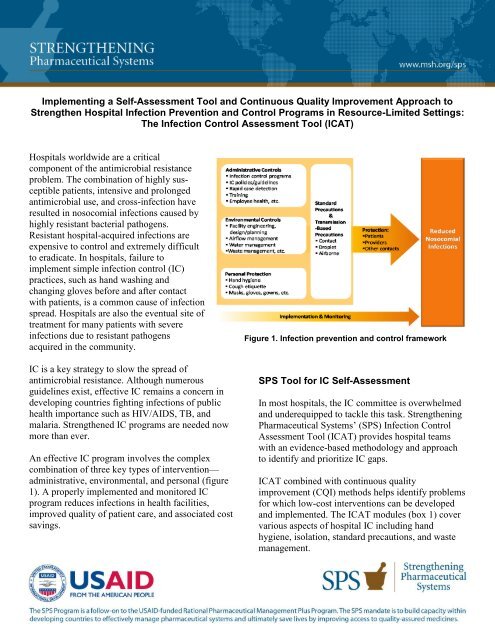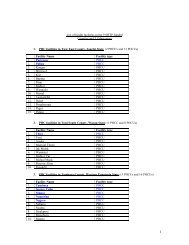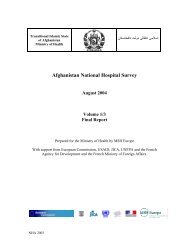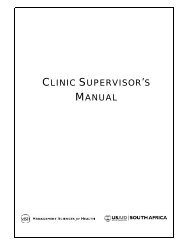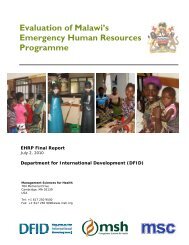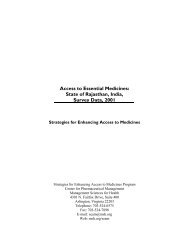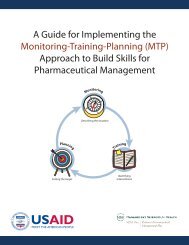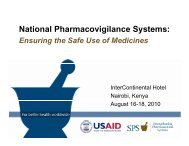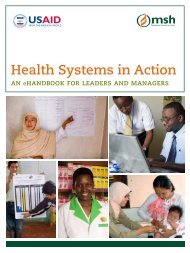Implementing a Self-Assessment Tool and Continuous Quality ...
Implementing a Self-Assessment Tool and Continuous Quality ...
Implementing a Self-Assessment Tool and Continuous Quality ...
You also want an ePaper? Increase the reach of your titles
YUMPU automatically turns print PDFs into web optimized ePapers that Google loves.
<strong>Implementing</strong> a <strong>Self</strong>-<strong>Assessment</strong> <strong>Tool</strong> <strong>and</strong> <strong>Continuous</strong> <strong>Quality</strong> Improvement Approach to<br />
Strengthen Hospital Infection Prevention <strong>and</strong> Control Programs in Resource-Limited Settings:<br />
The Infection Control <strong>Assessment</strong> <strong>Tool</strong> (ICAT)<br />
Hospitals worldwide are a critical<br />
component of the antimicrobial resistance<br />
problem. The combination of highly susceptible<br />
patients, intensive <strong>and</strong> prolonged<br />
antimicrobial use, <strong>and</strong> cross-infection have<br />
resulted in nosocomial infections caused by<br />
highly resistant bacterial pathogens.<br />
Resistant hospital-acquired infections are<br />
expensive to control <strong>and</strong> extremely difficult<br />
to eradicate. In hospitals, failure to<br />
implement simple infection control (IC)<br />
practices, such as h<strong>and</strong> washing <strong>and</strong><br />
changing gloves before <strong>and</strong> after contact<br />
with patients, is a common cause of infection<br />
spread. Hospitals are also the eventual site of<br />
treatment for many patients with severe<br />
infections due to resistant pathogens<br />
acquired in the community.<br />
IC is a key strategy to slow the spread of<br />
antimicrobial resistance. Although numerous<br />
guidelines exist, effective IC remains a concern in<br />
developing countries fighting infections of public<br />
health importance such as HIV/AIDS, TB, <strong>and</strong><br />
malaria. Strengthened IC programs are needed now<br />
more than ever.<br />
An effective IC program involves the complex<br />
combination of three key types of intervention—<br />
administrative, environmental, <strong>and</strong> personal (figure<br />
1). A properly implemented <strong>and</strong> monitored IC<br />
program reduces infections in health facilities,<br />
improved quality of patient care, <strong>and</strong> associated cost<br />
savings.<br />
Figure 1. Infection prevention <strong>and</strong> control framework<br />
SPS <strong>Tool</strong> for IC <strong>Self</strong>-<strong>Assessment</strong><br />
In most hospitals, the IC committee is overwhelmed<br />
<strong>and</strong> underequipped to tackle this task. Strengthening<br />
Pharmaceutical Systems’ (SPS) Infection Control<br />
<strong>Assessment</strong> <strong>Tool</strong> (ICAT) provides hospital teams<br />
with an evidence-based methodology <strong>and</strong> approach<br />
to identify <strong>and</strong> prioritize IC gaps.<br />
ICAT combined with continuous quality<br />
improvement (CQI) methods helps identify problems<br />
for which low-cost interventions can be developed<br />
<strong>and</strong> implemented. The ICAT modules (box 1) cover<br />
various aspects of hospital IC including h<strong>and</strong><br />
hygiene, isolation, st<strong>and</strong>ard precautions, <strong>and</strong> waste<br />
management.
Each individual module contains questions for self-<br />
assessment, a scoring system, <strong>and</strong> reference notes<br />
outlining the current internationally recognized<br />
practices. The modules are complemented with<br />
checklists to help objectively assess adherence to key<br />
IC practices. The tool can be adapted to suit local<br />
country context.<br />
Box 1. ICAT Modules<br />
1. Airway suctioning<br />
2. Employee health<br />
3. General ward<br />
4. H<strong>and</strong> hygiene<br />
5. Hospital Information<br />
6. Infection Control program<br />
7. Injections<br />
8. Intensive care unit<br />
9. Intravenous catheters<br />
10. Intravenous fluids <strong>and</strong> medications<br />
11. Isolation <strong>and</strong> st<strong>and</strong>ard precautions<br />
12. Labor <strong>and</strong> delivery<br />
13. Microbiology laboratory<br />
14. Pharmacy<br />
15. Sterilization <strong>and</strong> disinfection: equipment <strong>and</strong><br />
intravenous fluids<br />
16. Sterilization <strong>and</strong> disinfection: needles <strong>and</strong> syringes<br />
17. Sterilization <strong>and</strong> disinfection: sterile gloves<br />
18. Surgical antibiotic use <strong>and</strong> surgical equipment<br />
procedures<br />
19. Surgical area practices<br />
20. Tuberculosis precautions<br />
21. Urinary catheters<br />
22. Waste management<br />
The combined application of the ICAT <strong>and</strong> CQI<br />
cycles ensures that data will be available to direct<br />
readjusting interventions <strong>and</strong> maintaining<br />
improvements. IC is not the business of just the<br />
medical or nursing staff alone, but is the result of<br />
effective teamwork among the staff of all healthfacility<br />
disciplines, including administrative <strong>and</strong><br />
cleaning departments. This combined ICAT <strong>and</strong> CQI<br />
approach ensures sustainable improvements in IC<br />
practices, the reduction of nosocomial infections,<br />
<strong>and</strong> the containment of antimicrobial resistance<br />
(figure 2).<br />
Courtesy: Guatemala Ministry of Health <strong>and</strong> Social Assistance; adapted<br />
from—Massoud, R., K. Askov, J. Reinke, et al. 2001. A Modern Paradigm for<br />
Improving Healthcare. <strong>Quality</strong> QA Monograph Series 1(1). Bethesda, MD:<br />
Published for the U.S. Agency for International Development by the <strong>Quality</strong><br />
Assurance Project<br />
Figure 2. The self-assessment <strong>and</strong> CQI approach to<br />
strengthen infection prevention <strong>and</strong> control in hospitals<br />
Global ICAT/CQI Implementation<br />
Experiences <strong>and</strong> Accomplishments<br />
To date, the ICAT <strong>and</strong> CQI approach have been<br />
implemented in Guatemala, Namibia, South Africa,<br />
<strong>and</strong> Swazil<strong>and</strong>; <strong>and</strong> all have shown improved IC<br />
practices <strong>and</strong> programs. The IC teams in all countries<br />
felt strengthened <strong>and</strong> empowered by the availability<br />
of tools to use in their work <strong>and</strong> that the data<br />
generated served as a powerful advocacy tool for<br />
hospital management <strong>and</strong> administrators who<br />
became more involved in IC work. In each country,<br />
the hospital Infection Control Committee was<br />
oriented in the use of the ICAT <strong>and</strong> CQI approach;<br />
the committees then developed <strong>and</strong> implemented a<br />
quality improvement plan, which was also monitored<br />
<strong>and</strong> evaluated.
South Africa<br />
The national tool has been finalized.<br />
The national-level team has been trained to rollout<br />
the approach.<br />
An IC specialist has been seconded to the<br />
National Department of Health for one year.<br />
A national infection prevention <strong>and</strong> control<br />
manual is currently being developed.<br />
The National <strong>and</strong> Provincial <strong>Quality</strong><br />
Improvement Plans for 2011/12 have been<br />
implemented to prevent infections from being<br />
passed on in hospitals <strong>and</strong> clinics.<br />
Various ICAT modules are being used as<br />
research topics by honors degree students at the<br />
Nelson M<strong>and</strong>ela Medical School, University of<br />
KwaZulu-Natal.<br />
Emergency medical services (EMS) personnel in<br />
the Free State province have been trained on the<br />
ICAT by the provincial quality assurance staff.<br />
ICAT has been adapted for use in EMS facilities<br />
in the Free State Province.<br />
ICAT implementation has begun in a large<br />
number of public hospitals; studies have shown<br />
significant improvement in h<strong>and</strong> hygiene <strong>and</strong><br />
waste management practices.<br />
H<strong>and</strong> Hygiene Campaign at a Provincial<br />
Hospital, South Africa<br />
Guatemala<br />
A final Guatemalan version of the ICAT <strong>and</strong> user<br />
manual was produced by the Ministry of Health<br />
<strong>and</strong> used to roll out the approach to the national<br />
network of 43 hospitals.<br />
Follow-up <strong>and</strong> monitoring are being provided by<br />
the hospital coordinators of the Vice Ministry of<br />
hospitals; these coordinators are responsible for<br />
supervision of the hospitals.<br />
A surveillance system for nosocomial infections<br />
<strong>and</strong> an obligatory monitoring system were<br />
launched in the hospitals, whereby each hospital<br />
has to report a few key indicators on a monthly<br />
basis.<br />
The guidelines for infection prevention <strong>and</strong><br />
control are being revised.<br />
ICAT implementation at hospitals resulted in<br />
improved practices as demonstrated by pre- <strong>and</strong><br />
post-evaluation; availability of h<strong>and</strong> washing<br />
supplies has improved significantly.<br />
H<strong>and</strong> washing exercise during training in Guatemala<br />
Guidelines <strong>and</strong> poster development in Guatemala
Namibia<br />
ICAT has been implemented in eight hospitals.<br />
Training of trainers has been provided; a cadre of<br />
trainers is now available to work with hospitals<br />
throughout Namibia to implement the approach.<br />
The Ministry of Health has adopted the<br />
approach, developed an IC manual, <strong>and</strong> plans to<br />
implement ICAT in all 34 district hospitals in<br />
Namibia.<br />
ICAT implementation activities at hospitals have<br />
resulted in significant improvement in h<strong>and</strong><br />
hygiene <strong>and</strong> waste management practices;<br />
supplies <strong>and</strong> equipment for h<strong>and</strong> washing have<br />
improved.<br />
Swazil<strong>and</strong><br />
Hospital infection control committees have been<br />
established.<br />
ICAT has been introduced into eight hospitals.<br />
Results of ICAT implementation activities<br />
showed improved h<strong>and</strong> hygiene practices in two<br />
hospitals.<br />
Conclusions<br />
The use of ICAT with CQI is a straightforward <strong>and</strong><br />
sustainable approach that builds teamwork <strong>and</strong><br />
yields quantifiable improvements in hospitals IC.<br />
Stakeholders from the four countries have embraced<br />
the tool as useful, adapted it to local context, <strong>and</strong><br />
assumed ownership, thereby promoting an IC culture<br />
in their hospitals. Through use of ICAT <strong>and</strong> CQI,<br />
hospitals in these four countries have implemented<br />
multi-faceted interventions to improve practices in<br />
certain aspects of IC, for example, h<strong>and</strong> hygiene <strong>and</strong><br />
waste management. Despite facing similar<br />
challenges such as a shortage of human, financial,<br />
<strong>and</strong> material resources, the hospitals in all countries<br />
still managed to obtain results <strong>and</strong> improvements<br />
with simple, locally appropriate, low-cost<br />
interventions.<br />
Availability of ICAT<br />
The ICAT is available in English, French, <strong>and</strong><br />
Spanish. To view <strong>and</strong> download the English version,<br />
click on the following link—<br />
http://www.msh.org/projects/sps/SPS-<br />
Documents/upload/ICAT-composite_FINAL_May-<br />
2009.pdf<br />
To view <strong>and</strong> download the instruction manual for<br />
ICAT click on the following link—<br />
http://www.msh.org/projects/sps/SPS-<br />
Documents/upload/ICAT-User-Manual_Global-<br />
May-09.pdf<br />
For more information, please contact MSH/SPS<br />
at sps@msh.org.<br />
Participants at breakout session during ICAT<br />
implementation review workshop in Namibia


